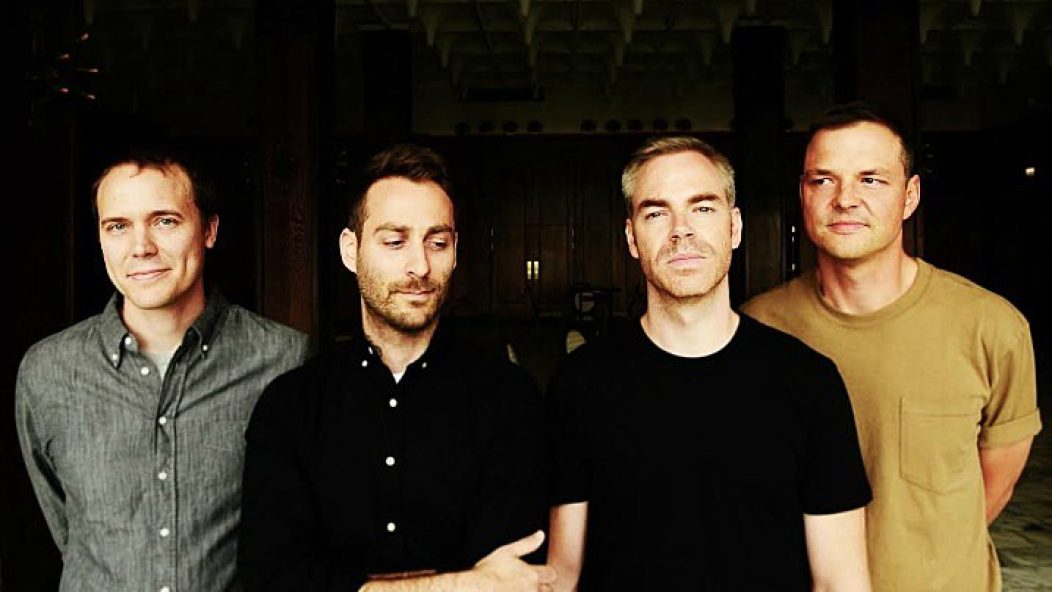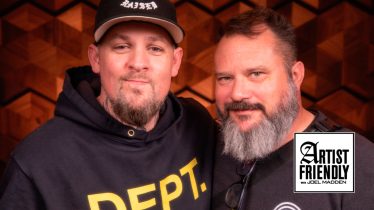
“This is where we are at now. We’re grown men.”—Mike Kinsella on the evolution of American Football
[Photo credit: Shervin Lainez]
At this point, when interviewing Mike Kinsella, most people will expect you to ask the 39-year-old American Football frontman about one of two things. The first is what it was like to relaunch his pioneering emo band to unparalleled fanfare, as Kinsella, guitarist Steve Holmes, drummer Steve Lamos and new(-ish) bassist Nate Kinsella did just a few years ago. Which, sure, makes sense: When American Football returned in early 2014, they sold nearly 6,000 tickets to their initial comeback shows in a matter of hours. This was the same band who, during their brief initial run, played almost exclusively to single digit college crowds in a small Illinois suburb. For a lot of people who spent the two decades since falling in and out of love to the sound of Kinsella’s late ’90s dorm room confessions, this was all a very big deal.
It was also treated like a minor event earlier this summer when Kinsella and his bandmates announced they would be releasing a follow-up to their inhumanly beloved 1999 self-titled debut. Which brings us to the other thing you would probably ask Kinsella about: the insane amount of pressure he has felt over the past year as he began writing what is inarguably the most anticipated album of his career. But the thing is, we only kind of talked about these things when AP called Kinsella at his home in Chicago this past September. Instead, we talked about property taxes. And driving his kids to school.
Which, when you actually get around to hearing American Football’s long-awaited second album, will make all the sense in the world. Much like The King Of Whys, the breathtaking folk-rock album that Kinsella released this past summer with his longtime solo vehicle Owen, the second eponymously titled American Football album is a beautiful and heartbreaking effort that poetically chronicles what it is like to reach middle age. Throughout, Kinsella sings about how it feels when the ghosts of your youth haunt you in your own home and how, when the responsibilities of adulthood so fully engulf you, it can be hard to even know who you are anymore.
While it may not mine the same lyrical territory as the band’s first album, that turns out to be a very good thing, as the material here is ultimately much more rewarding. Next year, Kinsella will spend even more time away from his family (which includes his wife Ryan, who works as a school teacher in Chicago, and his two young children, Mila and Archie) as he once again takes American Football out on tour. He’ll also turn 40. Which is why, in the conversation that follows, it seemed a lot more fitting to ask Kinsella to reflect on his life as a father and a husband, as well as how much longer he can see himself as a career musician.
So today is Friday and you currently are not on tour. What is a typical day in your life like when you are at home?
Well, I have two alarms set on my phone. One is for 7:22 a.m., which is the later one, and then there is a 7:08 a.m. one, because sometimes I sleep past the 7:08 a.m. one. [Laughs.] I got two kids that I have got to get to two different schools. [Then after school] I pick them up and I come home and make dinner. Then my wife comes home. It’s a totally normal day. [Laughs.] Unless I make plans to get out to meet friends, time flies by and I just find myself doing dishes all week.
When do you actually find time to write?
After everyone goes to bed, at around 8 or 9 p.m. I’ll go to [our practice] space and drink beer or I will go watch a game at a bar with headphones on. I will get a lot of writing done just watching other drunk people. I sort of turn my mind off all day and then get it all done at night.
Is that how you wrote the songs for this new American Football record?
Those were written either in the space or in bars. I would just write down lines or whatever ideas [I had]. I did the American Football record right after I recorded the Owen album, so I would go through all of my lyrics and push them to one side or the other. The sort of sarcastic ones fell on the Owen side and the more sincere ones became American Football stuff. I did the Owen [album this past winter] and then, for the American Football stuff, [the other band members] dove right into it. So I had to quickly figure out what these songs were about.
At what point did the four of you decide to do the band full-on again?
It was a little over a year ago. We had a band meeting. It was a lunch and we decided that if we wanted to keep doing this we needed to write new songs, because we can’t keep playing the same 12 songs forever. Then we were like, “If we want to write a new album, how could we do it?” The only reason not to do it is… there might be, like, a backlash. But then it’s also like, “What can we do? We can’t really control people who have lived with this old album for 15 years.” If they have this expectation that we can’t live up to, that’s not really our fault.
You are a big enough music fan that you can probably think of other bands that [have been] in a similar situation. I think of bands like Slint or the Postal Service where it seemed like a happy accident and they could never recreate that again. Was there any concern for you guys in terms of being able to top what you had done with the first record?
I mean… that first album is so flawed. [Laughs.] But I think that’s part of the attraction. It’s so youthful. From the way it was recorded to the lyrical content, there is no way to redo that. The response after we released the first new song [“I’ve Been So Lost For So Long”], people were complaining that the vocals sound too loud or confident. But it’s like, “I am a grown man now. I am not too shy to step out my front door anymore.” We tried, musically, to keep it in the same realm. But we weren’t necessarily comparing the albums. People lived with the other one for so long, there is no way.
And, if you wrote exactly in the same style as the first album, it would feel like a historical reenactment—
Yeah, it would feel like a cover band. So I just tried to sing about what is going on now.
When I look around at your peers who have either gone back to their old bands or had people continue to ask them to go back to their old bands—someone like Davey von Bohlen [from the Promise Ring] or Blake Schwarzenbach [from Jawbreaker]—there’s this total apprehension. They feel like, “No, I am not going to do that. I would be living in the past. I have to move forward.” So it’s kind of awesome to see someone say, “This is just a vehicle for me to write music still. I don’t have to be burdened by it.”
I feel like that came with age. I definitely would have had a different response 10 years ago—or even five years ago. The fact that the other dudes got jobs and my wife teaches so I am at home with these kids, it [makes doing this band] not the be-all, end-all. We’re not trying to “make it.” This is all gravy. We’ve been saying that for some time and I think that at some point people don’t believe it. But this [was] not supposed to have happened.
You talked for a moment about comparing the two records. For a lot of people, the first American Football record was clearly a breakup record.
Sure.
“That’s the problem with comparing the two records. This is where I am at now. That’s where we’re at, all of us. We’re grown men. So we are going to write different music. We are going to complain about different things other than how some girl doesn’t like me.”
But lyrically this new record—as well as The King Of Whys—have been about middle age and the sort of heartbreak and challenges that come with that particular experience. Would you agree with that?
Yeah, I would. But I didn’t choose to do that as much as that is just what I am living now. It wasn’t like, “How am I going to get all of these old people to relate to me? I know, I’ll write about old age!” [Laughs.] That’s the problem with comparing the two records. This is where I am at now. That’s where we’re at, all of us. We’re grown men. So we are going to write different music. We are going to complain about different things other than how some girl doesn’t like me.
But, in doing that, it has made for much more challenging material. For instance, I just turned 38. I have a 4-year-old son. I have been with my wife for 15 years.
But that’s, like, heavy shit, right? [Laughs.]
It is. On the outside, people think this is the point in life where you find happiness. But it’s actually really hard. There are a lot of things that are incredibly hard about it.
Yeah, I mean, I am a happily married dude and I love my kids and I am home with them all day. I chose to do that. But you can definitely lose your mind.
I don’t know. I always [thought] music had to be sort of sad. Those were my favorites bands–like the Smiths or the Cure. I just thought that’s what music was. My wife obviously doesn’t listen to my music or like my music. She is always like, “Why did this [part of our life] bum you out?” And I am like, “I don’t know. It just bummed me out this one time—and I wrote it down!” [Laughs.] It’s not like I live my life as the most miserable guy ever. It’s just a way to vent.
Has your wife listened to the new American Football record yet? Because it does feel like a lot of these songs are about the challenges that come with marriage.
I don’t think she has sat with it. We listened to a test pressing a couple times really loud, and she was sort of in the house. [Laughs.] I think she has probably listened each time a new single has been released. But she kind of doesn’t want to hear it. It’s not that fun for her. She is also busy shaping high school kids’ minds. She doesn’t have time for this.
On the The King Of Whys, you wrote about your dad who passed away [on a song called “A Burning Soul,” which also chronicles his father’s alcoholism]. As a dad with two kids now, how has your perspective on him changed?
It’s changed a lot. It’s not, like, full circle. I still really don’t have sympathy [for him]. But I empathize with him more than I ever did. It’s just not easy, like you said, having kids. Or even being stagnant in life. There is something about that that’s not always satisfying. So now, I think can appreciate why he did the things that he did, to some extent.
Kinsella and his youngest son, Archie
[Photo by Shervin Lainez – Courtesy of Mike Kinsella / Instagram]
You have now been in bands for almost 25 years—longer than you haven’t been in bands.
Probably. Yeah, sure.
Do you ever think about what your life would be like without being a musician?
[Pauses.] I don’t know. I know that I couldn’t sit in an office all day. There are a couple of other jobs I would like to do. I think I could be, like, a travel food guy—like on the Travel Channel. But that’s about it. Otherwise I think that by playing music I am doing what I am supposed to.
Do you see yourself doing this in 10 years? Do you think this will still be the balance for you—weighing fatherhood with being a musician?
It’s a good question. My kids are almost at the point where they are going to school every day. So I don’t know what I am going to do with myself. In theory, I can write a lot more music. But I’m not sure if a lot more music will come out of me. I can’t get an office job. And I don’t have any other skills. [Laughs.] So I will probably still be doing this. ALT







